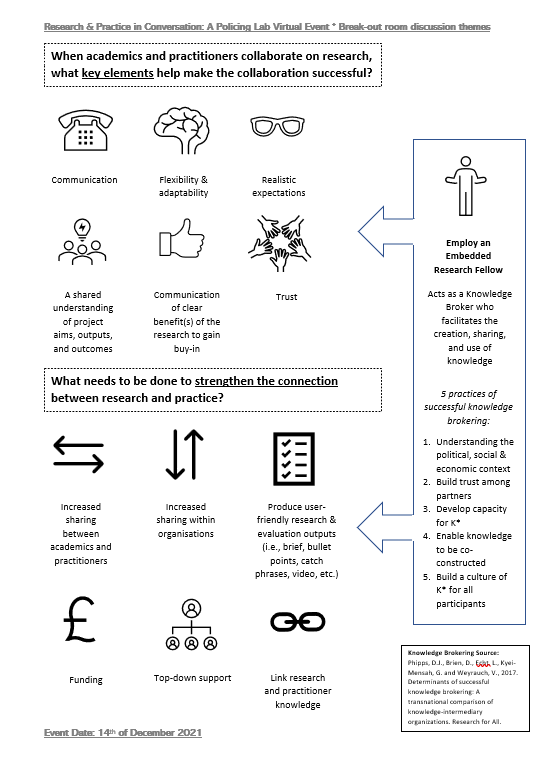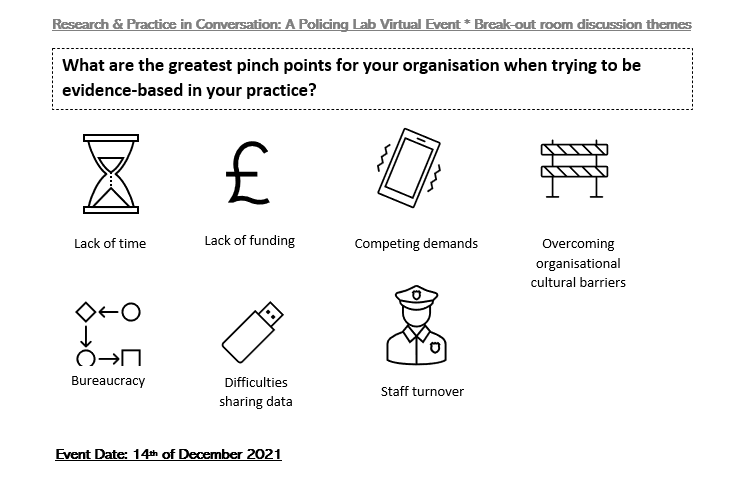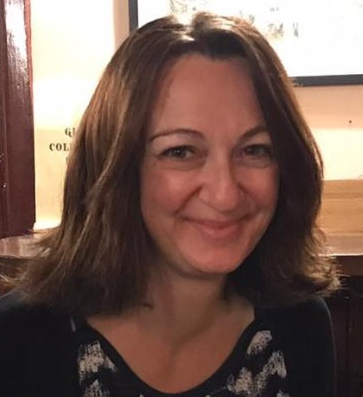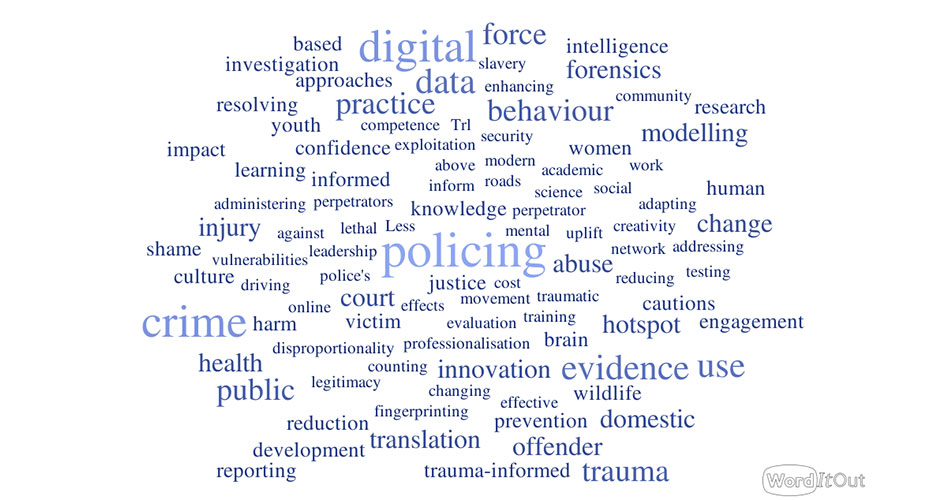
When academics and practitioners collaborate on research,what key elements help make the collaboration successful.

What are the greatest pinch points for your organisation when trying to be evidence-based in your practice?
Research and Practice in Conversation: A Policing Lab Virtual Event
Policing Lab Events
Policing Lab Events
Policing Lab Events
Policing Lab Events
Policing Lab Events
Policing Lab Events
Policing Lab Events
Policing Lab Events
Tue, 14 December 2021, 10:00 – 16:00 GMT
A space for academics & practitioners to share research & discuss how to facilitate knowledge exchange & evidence-based practice.
The aim of this event was to provide an opportunity for academics and practitioners who do work with policing, to come together, learn from one another, and engage in dialogue about research, knowledge exchange, and evidence-based practice.
Objectives
- Increase awareness of the research going on at the University of Exeter, Devon and Cornwall Police and elsewhere related to policing
- Provide an opportunity for academics and practitioners to learn from each other's experiences and perspectives
- Introduce practitioners to potential topics and methods of interest
- Inform future research agendas
Event hosts
The event was hosted by Dr. Katharine Boyd, Senior Lecturer, Criminology and Professor Brian Rappert, Professor of Sociology both of the University of Exeter.
Timetable

Dr. Daniel Chalk Senior Research Fellow in Applied Healthcare Modelling and Analysis, PenARC, University of Exeter

Gavin Bardsley Head of Performance & Analysis, Devon and Cornwall Police
Presentation Abstract:
Since 2016, the NIHR Applied Research Collaboration for the South West Peninsula (PenARC) has run an innovative capacity building programme - the Health Service Modelling Associates (HSMA) Programme. In this programme, staff from health and social care organisations are released for a day a week for a year to undertake an Operational Research (OR) or Data Science project that addresses an issue of importance for their organisation. Over the first 3 months, they receive intensive training in a wide variety of OR and Data Science techniques, including modelling queuing problems using Discrete Event Simulation, modelling whole system interactions using Network Analysis, modelling behaviour using Agent Based Simulation, and using Artificial Intelligence (AI) methods such as Machine Learning and Natural Language Processing. HSMAs pitch ideas for projects to apply these skills to problems in their organisations, and a number of projects are taken forward. HSMAs receive ongoing mentoring support from an experienced OR / Data Science academic, as well as senior support within their organisation. HSMA projects have directly led to brand new £multi-million mental health services, supported the rollout of the COVID-19 mass vaccination programme, led to new services and resourcing for urgent and emergency care, discharge processes and stroke care, and established new Operational Research teams within NHS organisations across the region. In 2020, in partnership with Devon and Cornwall Police, and with funding support from the Policing Lab, we piloted the Police Service Modelling Associates (PSMA) Programme. The aim of this pilot was to open up the HSMA programme to a cohort of policing staff, and apply the successful model of the programme to tackle issues in policing and wider health systems. We recruited 10 PSMAs from police forces across the South West, as well as from the College of Policing. Three projects were taken forward into the 9 month phase of the programme. In this talk, we'll describe what happened in the programme and the excellent project work developed by our pilot PSMAs. We'll also talk about the impact the programme has had for Devon and Cornwall Police, as well as some of the challenges encountered, and our plans for the future of the programme.
Presenter Bios:
Daniel Chalk is a Senior Research Fellow in Applied Healthcare Modelling and Analysis in the NIHR Applied Research Collaboration for the South West Peninsula (PenARC), based in the University of Exeter Medical School. Dr Chalk's main role is leading the HSMA Programme, but also has interests in Discrete Event Simulation, behavioural modelling using Agent Based Simulation and Natural Language Processing to automate the extraction of information from free text. Dr Chalk is a Computer Scientist by background, and has experience in ecological modelling from his PhD in Biosciences - both studied at the University of Exeter.
Gavin Bardsley is Head of Performance & Analysis at Devon and Cornwall Police. Gavin has 19 years of police staff career development, starting out as a Forensics Intelligence Analyst at West Midlands Police before moving to Devon and Cornwall Police in 2007. Since then, he has progressed in roles within the Performance & Analysis department and is currently the Head of Department. He commenced a MSt. Degree in Applied Criminology and Police Management at Cambridge in 2019 and graduated in October 2021.
Presentation Slides:
Jo Arundale, Temporary Commander for Cornwall and the Isle of Scilly
Presentation Abstract:
'Hot Spot' Policing is generally accepted as a meaningful way to direct resources and reduce serious violent crime. The strategy involves patrolling of crime 'hot spots' derived from statistical crime data for certain periods of time and is supported by empirical evidence in studies conducted across the UK, Europe, US, Asia and Australia. Research evidence demonstrates a tangible reduction in patrolled 'hot spots' compared to control areas. This presentation describes a hot spots implementation trial funded by the Policing Lab Fund and implemented in collaboration between Devon and Cornwall Police and University of Exeter (in particular, Dr. Marcos Oliveira, Dr. Ronaldo Menezes, and PhD student Clodomir Joaquim DeSantana Jr.).
Presenter Bios:
Jo Arundaleis a graduate of the National High Potential development scheme and undertook her Masters in Police Leadership and Management at Warwick Business School, focusing on the challenges of delivering Randomised Control Trails in Operational settings. Jo is now the Temporary Commander for Cornwall and the Isle of Scilly.
Presentation Slides:

Dr. Abi Dymond Senior Lecturer in Sociology and Criminology, University of Exeter
Presentation Abstract:
Police use of force, including the use of the less lethal weapon the Taser, is often considered a controversial and complex area to research. This presentation draws on a number of different research studies on this topic with which the author has been involved, each with different ways of engaging with and working alongside the police and other stakeholders. In particular, it draws on the 'traffic lights' evaluation technique which identifies practices that could, or should, be stopped (corresponding to the red traffic light), practices that should be continued (corresponding to the amber traffic light), and practices that should be started (corresponding to the green traffic light), to discuss methodological lessons learnt from the various research processes employed in the different studies.
Presenter Bio:
Abi Dymond is a Senior Lecturer in Criminology at the University of Exeter, where she focuses on the use of force in policing and detention environments. She serves in a number of advisory / expert roles to and for a number of organisations nationally (including the College of Policing, the NPCC and HMIC) and internationally (including the UN Office of Drugs and Crime, the UN OHCHR and the Organisation for Security and Co-operation in Europe).
Presentation Slides:

Dr. Rebecca Helm Senior Lecturer in Law, University of Exeter

Penelope Gibbs External Advisor, Transform Justice
Presentation Abstract:
In this talk we will discuss our work examining decisions to accept (or reject) out of court disposals, particularly in child suspects. Where suspects need to admit guilt for a case to be dealt with out of court an incentive to 'admit' guilt is created for innocent as well as guilty suspects and suspects exercising their right to silence become ineligible for out of court disposal. We examine perspectives we have obtained from work with lawyers in this area, as well as relevant psychological pressures, and discuss whether requiring admissions may be creating an unnecessary hurdle to utilising out of court disposals.
Presenter Bios:
Rebecca Helm is the Director of the University of Exeter Evidence-Based Justice Lab, and a Clinic Solicitor in the Law School. She is also a current UK Research and Innovation Fellow. She conducts work at the intersection of psychology, data science, and law, looking at how the legal system functions in practice and how changes to policy and regulation are likely to influence outcomes.
Penelope Gibbs worked in radio production and at the BBC before being inspired to influence social change in the third sector. She set up the Voluntary Action Media Unit at TimeBank before joining the Prison Reform Trust to run the Out of Trouble – a five year campaign to reduce child and youth imprisonment. Penelope set up Transform Justice in 2012 to advocate for a fairer, more open, more humane and more effective justice system. The charity has published reports on a variety of criminal justice issues. Penelope has also sat as a magistrate.
Presentation Slides:
Dr. Lewys Brace Lecturer in Data Analysis, Criminology, University of Exeter
Presentation Abstract:
The Incel (short for “involuntary celibate”) ideology is a misogynistic worldview whose proponents blame women for their lack of sexual activity. These individuals communicate and share their views via the “Incelosphere”, a loose conglomerate of online Incel communities spread across various digital platforms. The interactions on these digital platforms have given rise to a subculture that has become a subject of concern due to both the Incelsphere itself exhibiting progressively extremist and violent rhetoric and incidents of Incel-related violence increasing in frequency; with the first such act of violence happening in the UK during August of this year. This presentation will provide an overview of the Incel subculture and the nature of its extremist tendencies, how it has spread both online and offline, and the nature of its relationship with the far-right.
Presenter Bio:
Lewys Brace is a Lecturer in Data Analysis and part of the University of Exeter's Q-Step Centre, where he specialises in data science, extremism, terrorism, cybercrime, and Open-Source Intelligence (OSINT). His research currently focuses on online extremist radicalisation, with a particular focus on the far-right and Incel movements, as well as the development of computational research methods for the social sciences.
Presentation Slides:

Dr. Dana Wilson-Kovacs Associate Professor in Sociology, University of Exeter
Presentation Abstract:
Drawing on ethnographic fieldwork and interviews with digital forensic practitioners, police officers and forensic and police managers, this presentation focuses on the uptake and integration of digital forensics practices in the investigation of crime. The discussion will reflect on the complex organisational contexts of digital forensics, and the investigative, technological and regulatory challenges this rapidly evolving area is currently facing.
Presenter Bio:
Dana Wilson-Kovacs is Associate Professor in Sociology at the University of Exeter. Her recent research examines the development and application of digital forensics in the investigation of crime.
Presentation Slides:

Dr. Criss Burgess Senior Lecturer in Psychology, University of Exeter

Olly Taylor Traffic Inspector, Devon and Cornwall Police
Presentation Abstract:
Operation One Chance was a trial of a roadside intervention for drivers committing a range of non-serious traffic offences in Devon and Cornwall and ran for two months during Autumn 2020. Traffic Inspector Olly Tayler (Devon & Cornwall Police) designed the intervention and Dr Cris Burgess (Psychology, UoE) provided expertise for the evaluation. Olly and Cris will discuss the development and context of Operation One Chance, before describing the main results of the evaluation and future opportunities for this type of road safety intervention.
Presenter Bios:
Cris Burgess has been at the University and involved in road safety research for over 25 years. He has worked with a variety of police forces nationally, local and central government, as well as UK armed forces. Since 2006, he has been a member of the Research & Development Unit for UKROEd, the organisation responsible for the UK’s traffic offender diversionary courses, reviewing and managing existing courses, as well as developing new courses in response to roads policing needs nationally. Olly Taylor joined Devon & Cornwall Police in 1993, spending the past 13 years in Roads Policing. He was awarded the Queens Police Medal in 2015 for his work with young drivers. Olly is married with two sons, both of whom have passed their driving tests, so making the roads safer for all is at the heart of everything he does.
Presentation Slides:

Gavin Bardsley Head of Performance & Analysis, Devon and Cornwall Police
Presentation Abstract:
The presentation is based on the research undertaken as part fulfilment of the MSt. degree. This research developed and applied the blueprint set out by the Cambridge Consensus Statement (June 2020), that recommended how crime and detections should be counted, to Devon and Cornwall police data.
Presenter Bio:
Gavin Bardsley is Head of Performance & Analysis at Devon and Cornwall Police. Gavin has 19 years of police staff career development, starting out as a Forensics Intelligence Analyst at West Midlands Police before moving to Devon and Cornwall Police in 2007. Since then, he has progressed in roles within the Performance & Analysis department and is currently the Head of Department. He commenced a MSt. Degree in Applied Criminology and Police Management at Cambridge in 2019 and graduated in October 2021.
Presentation Slides:

Prof. Huw Williams Professor in Clinical Neuropsychology, University of Exeter

Sarah Carlsen-Browne Senior Manager for Criminal Justice (People), Devon and Cornwall Police
Presentation Abstract:
Brain Trauma and other Neuro-disabilities are highly prevalent in people who are in contact with the law. TBI is linked to problems in memory, planning and impulse control. TBI is a risk factor for earlier onset of crime, reactive violence, recidivism and difficulty in engaging with rehabilitative programs. We worked with Devon and Cornwall Police to enable screening of TBI in their service users, and provided advice on management techniques (e.g. to manage memory issues). We present examples of how delivery of services is improved with attention to such issues.
Presenter Bios:
Huw Williams is a Professor in Clinical Neuropsychology with a background in Neuro-Rehabilitation of brain injury and PTSD (Post Traumatic Stress Disorder), and, more recently, research on the prevalence, correlates and management of Traumatic brain Injury (TBI) in people in contact with the law. Sarah Carlsen-Browne is currently the Senior Manager for Criminal Justice (People) in DCP, with her substantive role as Pathfinder Manager (Deferred Prosecution). Previously, she has worked in Commissioning with OPCC, and with young offenders and excluded young people as County Coordinator for the Hampton Trust, a Young Persons Adviser and Teacher. Pathfinder has been operational for four years and within that period has undertaken an RCT with Cambridge University, research with Exeter University to understand the prevalence of TBIs in those that come into contact with the CJS and how to adapt approaches; and is currently in discussions with Edinburgh University around a study in relation to perceptions of the Police.
Presentation Slides:

Dr. Katharine Boyd Senior Lecturer in Sociology and Criminology, University of Exeter
Presentation Abstract:
Domestic Abuse (DA) is a high-volume crime with significant physical and wellbeing impacts for victims, perpetrators, families, the police and other stakeholders in society. This presentation will draw on three specific studies that investigate harm, measured by the Cambridge Crime Harm Index, and DA. Specifically, this presentation will discuss analysis that found harm decreased across repeat incidents of DA, a study of gender differences in harm and frequency of DA perpetration in co-abusive relationships, and research findings investigating predictors of greater harm for DA offenders with multiple victims (serial DA offenders). These studies use varying methods –growth curve modelling, social network analysis, multi-level regression –to show how characteristics of the individuals and the relationships between them impact DA harm which provide implications for police and stakeholders.
Presenter Bio:
Katharine Boyd is a Senior Lecturer in Criminology at the University of Exeter. She is Director of Criminology Programmes and Co-Director of Exeter's Q-Step Centre. Her research interests are violence, domestic abuse, and terrorism.
Presentation Slides:
10:00 – 10:10: Introduction & Welcome (Prof. Brian Rappert)
10:10 – 10:50: Panel 1
Topic: The Police Service Modelling Associates (PSMA) Programme - Teaching Applied Modelling and Data Science
• Dr. Daniel Chalk, Senior Research Fellow in Applied Healthcare Modelling and Analysis, PenARC, University of Exeter
• Gavin Bardsley, Head of Performance & Analysis, Devon and Cornwall Police
Topic: Hot Spots Policing
• Jo Arundale, Chief Superintendent Local Policing, East Cornwall, Devon and Cornwall Police
10:50 – 11:35 : Panel 2
Topic: Use of force, Taser... and traffic lights? Identifying methodological good practices and lessons learnt
• Dr. Abi Dymond, Senior Lecturer in Sociology and Criminology, University of Exeter
Topic: Deflection, Diversion, and Incentivised Admission
• Dr. Rebecca Helm, Senior Lecturer in Law, University of Exeter
• Penelope Gibbs, External Advisor, Transform Justice
11:35 -11:50: Break out session 1
11:50 - 12:35: Panel 3
Topic: The Online Subculture of the Incels
• Dr. Lewys Brace, Lecturer in Data Analysis, Criminology, University of Exeter
Topic: Challenges and Opportunities in the Use of Digital Forensics in Investigations
• Dr. Dana Wilson-Kovacs, Senior Lecturer in Sociology, University of Exeter
12:35 - 13:30: LUNCH
13:30 - 14:15: Panel 4
Topic: Operation One Chance and Roads Safety
• Dr. Cris Burgess, Senior Lecturer in Psychology, University of Exeter
• Olly Tayler, Traffic Inspector, Alliance Roads Policing, Devon and Cornwall Police
Topic: Demonstrating the Cambridge Consensus Statement for Counting Crime and Detections
• Gavin Bardsley, Head of Performance & Analysis, Devon and Cornwall Police
14:15 - 14:30: Break out session 2
14:30 - 15:00: Brian Introduces ‘bite-size’ session
‘Bite-Size' Session (during this session you can select as few or as many pre-recorded ‘bite size’ sessions to view).
15:00 - 15:45: Panel 5
Topic: Traumatic Brain Injury Screening & Offender Management
• Prof. Huw Williams, Associate Prof. of Clinical Neuropsychology, University of Exeter
• Sarah Carlsen-Browne, Senior Manager for CJ (People), Devon and Cornwall Police
Topic: Domestic Abuse and Harm: Evaluating trends and trajectories to inform practice
• Dr Katharine Boyd, Senior Lecturer in Criminology, University of Exeter
15:45 -16:00: Closing and general Q&A (Dr. Katharine Boyd)
Bitesize presentations
Additional bite-size presentations will be added in the coming days.

Dr. Bethany Growns is a cognitive psychologist and Postdoctoral Research Fellow in the Evidence-Based Justice Lab at the University of Exeter. Her works focuses on exploring the psychology behind how forensic scientists make decisions in their work. Dr Growns works closely with her industry and forensic science collaborators to use this research to develop training programmes and selection tools to improve practice in forensic science.
Presentation Title: Moving the conversation beyond bias: exploring the cognitive mechanisms underpinning forensic science expertise.
>> View presentation

T/Ch Insp Gareth Twigg, 27 years with Devon & Cornwall Police, roles have included Diverse Communities Team manager and most recently the force lead for Covid. Am also a Tactical Firearms Commander. My research focused on police legitimacy in a rural area.
Presentation Title: Crime and Police Legitimacy: Views from the Countryside
>>View presentation

Dr. Luna Dolezal is an Associate Professor in Philosophy and Medical Humanities. She is PI on the Shame and Medicine Project and the Scenes of Shame and Stigma in COVID-19 Project, and with her team is developing principles for shame-sensitive practice for practitioners in healthcare, social care and policing.
Presentation Title: Considering Shame and Shame-Sensitive Practice in Policing
>> View presentation

Dr. Lewys Brace is a Lecturer in Data Analysis and part of the University of Exeter's Q-Step Centre, where he specialises in data science, extremism, terrorism, cybercrime, and Open-Source Intelligence (OSINT). His research currently focuses on online extremist radicalisation, with a particular focus on the far-right and Incel movements, as well as the development of computational research methods for the social sciences.
Presentation Title: Introduction to social networks
>> View presentation
Presentation Title: Introduction to textual data analysis
>> View presentation

Alexandra Smith is Devon County Council’s (DCC) Public Health Research Support Officer, a post funded by the National Institute for Health Research Clinical Research Network. Essentially, I enable public health research in the Local Authority with collaborative partners to build the research evidence base. I do this through networking between diverse organisations and personnel who have a broad influence on public health, including academics and researchers, Devon and Cornwall Police, colleagues across DCC, and associated partnerships. I work broadly across all public health fields, leveraging opportunities for collaboration, grant applications, research opportunities and implementation.
Presentation Title: Enabling the Public Health Evidence Base
>> View presentation

Dr. Penny Xanthopoulou is a qualitative researcher in mental health. She studied Psychology at East London University, London School of Economics and Loughborough University. After completing her PhD, Penny was a Research Associate at the Department of Epidemiology and Public Health, University College London. In 2015, Penny joined the Mental Health Research Group at the University of Exeter Medical School as a Research Fellow in mental health. Her research includes: patient experience; clinical communication; and policing mental ill health.
Presentation Title: Subjective experiences of the police response to mental health crises. A systematic review of the qualitative evidence
>> View presentation

Dr. Dreolin Fleischer is a Research Fellow at the University of Exeter who is interested in evidence-based policing, evaluation, utilization, and knowledge exchange. Embedded in Devon and Cornwall Police since 2017, she contributes to evidence-based policing strategies within Force while also liaising with a network of academics at the University of Exeter who do or are interested in policing research. She divides her time between this and working on specific research and evaluation projects related to policing.
Presentation Title: Observations from an Academic Research Fellow Embedded Within a Police Force
>> View presentation
Simon Chant is a Consultant in Public Health at Devon County Council.

